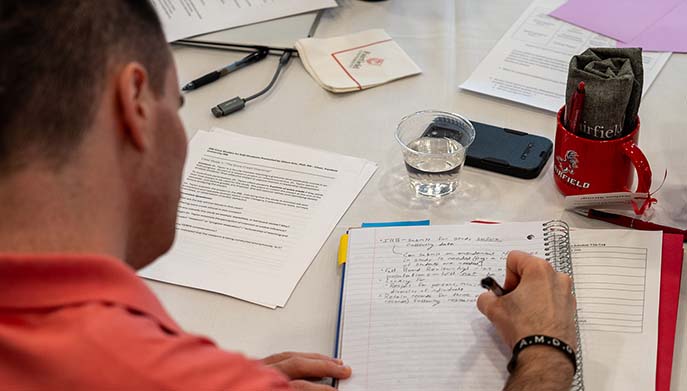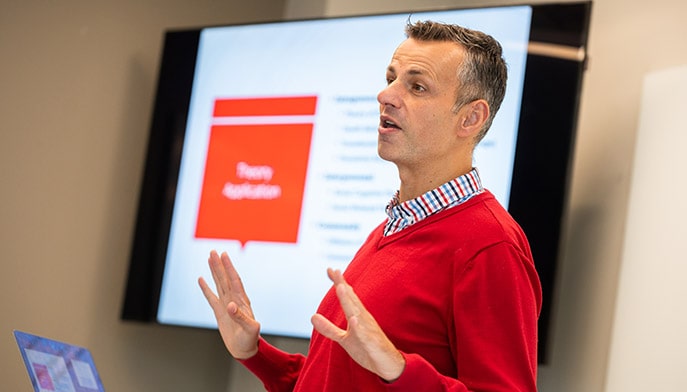
If you’re seriously considering applying for a master’s program, you’re probably already aware of the graduate school requirements you need to fulfill. One of them is likely a personal statement, which many students consider one of the hardest components to start. It requires a clear vision, excellent writing, and a certain level of self-awareness.
Keep reading for tips and advice for writing a personal statement that will make a lasting impression.
First, what is a personal statement?
Admissions committees often require a personal statement for graduate school to get a sense of who you are, why you’re a good fit for the program, and why you feel the program or school is a good fit for you. It offers you a chance to add color and personality to your application.
This component has the most room for creativity and storytelling, so it should not be treated as a rinse and repeat of your resume. Take advantage of this opportunity to highlight characteristics, experiences, or anecdotes that aren’t reflected elsewhere in your application.
“At Fairfield, our faculty and program directors are highly involved in the admissions process,” says Melanie Rogers, Director of Graduate Admission at Fairfield University. She goes on to explain that “They use the personal statement to evaluate things like a student’s understanding of the field, clinical or professional experience and commitment to the program’s mission statement.”
Things to consider before writing your personal statement
Before getting started, take some time to reflect on your motivations, qualifications, and aspirations for earning a master’s degree. Not only will this help you write more efficiently, but it will also help you understand your motivations, qualifications, and aspirations for earning a master’s degree.
Ask yourself questions like:
- What makes you different or stand out amongst other applicants?
- What do you want the admissions committee to know about you?
- What challenges or obstacles did you have to overcome to get where you are today?
- How might you use your graduate degree to achieve your career goals?
- What relevant experience do you have that makes you a good fit for this program?
- Why did you choose to pursue this field of study?
- What are you most excited to learn about?
When you’re able to articulate what makes you unique and what you bring to the table, it will be much easier to write an authentic and engaging personal statement.
6 personal statement tips for grad school hopefuls
Now that you have a clear idea of what you’re writing and why, you are ready to get started. Consider the following advice for writing a standout personal statement for grad school.
1. Read the instructions carefully
Every program you apply to is going to have a slightly different admissions process and requirements. That’s why it’s important to read all of the instructions and information thoroughly and adjust your application accordingly.
Some things to pay special attention to include:
- Word count/page limit
- Line spacing
- File format
- Question prompts
- Due dates
2. Do your research
In order to tailor your program of research, you’ll need to do some research. Take detailed notes of anything that stands out to you, whether it’s a fascinating course, an impressive professor, an interesting project, or something else.
As you write, look for ways to incorporate these details into your personal statement. This signals to the admissions committee that you are genuinely interested in this particular program and have done your homework.
3. Find your focus and be authentic
It is important to be truthful and genuine when composing your personal statement. Choose just a few anecdotes, achievements, or formative experiences to craft a story around — the more specific, the better. Remember, the goal of your application and personal statement is to be invited for an interview, during which you can elaborate on the rest of your story.
4. Get perspective from your friends, family, and mentors
Writing things like a cover letter or personal statement can be difficult. Sometimes, all it takes is for you to see yourself through the eyes of others. That’s why it can be incredibly helpful to talk with people who know you well and are familiar with your personal journey.
You can ask them to do things like:
- Share their opinions on your strengths and what you have to offer
- Describe how you’ve grown and changed in the time they’ve known you
- Choose five words they would use to describe you to a stranger
- Provide feedback on your personal statement and resume
Discussing your application with those you trust is great practice and will help you boost your confidence.
5. Don’t settle for your first (or second) draft
Your personal statement for graduate school isn’t something you throw together at the last minute. The sooner you can start working on it, the better. Build in time for multiple drafts and rounds of review. Ideally, you’ll give yourself three weeks or more to work on your personal statement and resume. Allow others to review it, make edits and perfect it before submitting.
6. Proofread, proofread, proofread
This should be obvious, but typos in your personal statement can be a red flag for admissions committees.
A clean, error-free statement reflects well on your ability to write academic papers and essays, which is a key requisite to be successful in higher education. So, before you hit “submit,” consider using a tool like Grammarly to get a free assessment on spelling, grammar, and other formatting practices.



